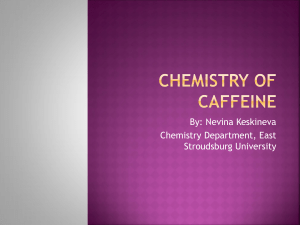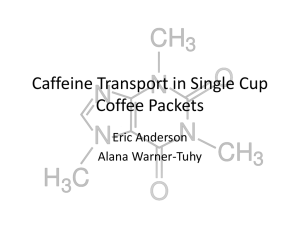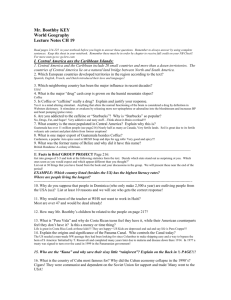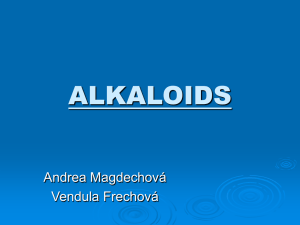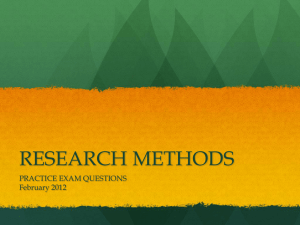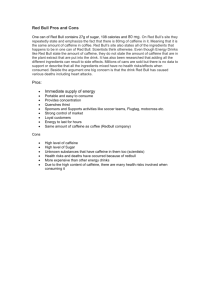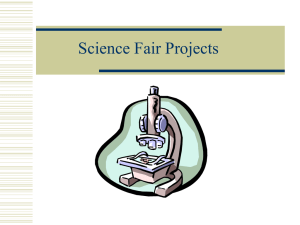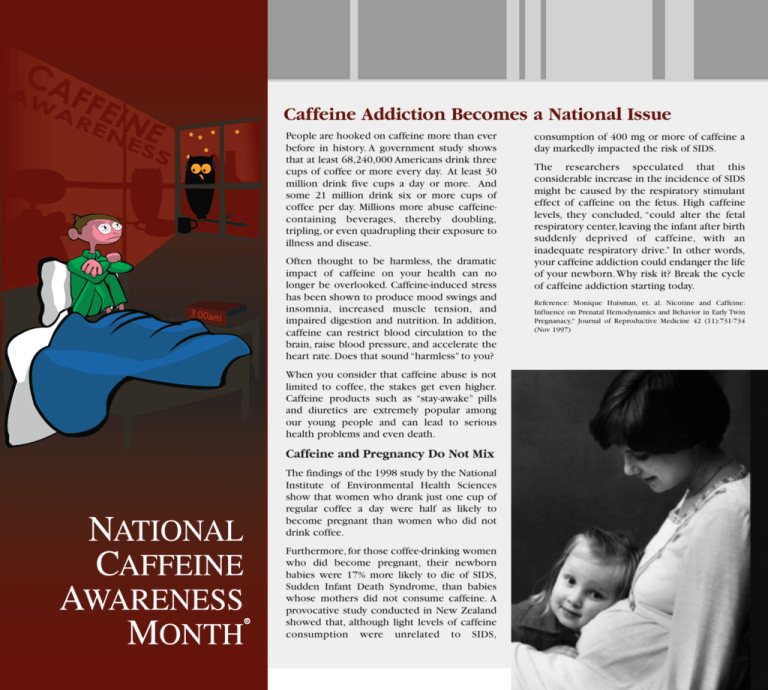
Caffeine Addiction Becomes a National Issue
People are hooked on caffeine more than ever
before in history. A government study shows
that at least 68,240,000 Americans drink three
cups of coffee or more every day. At least 30
million drink five cups a day or more. And
some 21 million drink six or more cups of
coffee per day. Millions more abuse caffeinecontaining beverages, thereby doubling,
tripling, or even quadrupling their exposure to
illness and disease.
Often thought to be harmless, the dramatic
impact of caffeine on your health can no
longer be overlooked. Caffeine-induced stress
has been shown to produce mood swings and
insomnia, increased muscle tension, and
impaired digestion and nutrition. In addition,
caffeine can restrict blood circulation to the
brain, raise blood pressure, and accelerate the
heart rate. Does that sound “harmless” to you?
When you consider that caffeine abuse is not
limited to coffee, the stakes get even higher.
Caffeine products such as “stay-awake” pills
and diuretics are extremely popular among
our young people and can lead to serious
health problems and even death.
Caffeine and Pregnancy Do Not Mix
The findings of the 1998 study by the National
Institute of Environmental Health Sciences
show that women who drank just one cup of
regular coffee a day were half as likely to
become pregnant than women who did not
drink coffee.
Furthermore, for those coffee-drinking women
who did become pregnant, their newborn
babies were 17% more likely to die of SIDS,
Sudden Infant Death Syndrome, than babies
whose mothers did not consume caffeine. A
provocative study conducted in New Zealand
showed that, although light levels of caffeine
consumption were unrelated to SIDS,
consumption of 400 mg or more of caffeine a
day markedly impacted the risk of SIDS.
The researchers speculated that this
considerable increase in the incidence of SIDS
might be caused by the respiratory stimulant
effect of caffeine on the fetus. High caffeine
levels, they concluded, “could alter the fetal
respiratory center, leaving the infant after birth
suddenly deprived of caffeine, with an
inadequate respiratory drive.” In other words,
your caffeine addiction could endanger the life
of your newborn. Why risk it? Break the cycle
of caffeine addiction starting today.
Reference: Monique Huisman, et. al. Nicotine and Caffeine:
Influence on Prenatal Hemodynamics and Behavior in Early Twin
Pregnanacy," Journal of Reproductive Medicine 42 (11):731-734
(Nov 1997)
Are you a Java Junkie?
If you’re like many people, you enjoy your daily cup of
coffee, right? But, did you know that 3 out of every 4 consumers are actually addicted to caffeine? Similar to nicotine
and alcohol addiction, coffee drinkers can suffer from the
debilitating effects of a drug they didn’t even know they
were taking: Caffeine.
Because most people are unaware that coffee and other
caffeine-containing drinks are mood-altering substances,
addictions can lay undetected for years.Telltale signs such as
irritability and mood swings are often written off as
personality traits rather than what they truly are: indicators
of a caffeine addiction and all the internal damage that goes
along with this hidden disease.
Caffeine—Addiction with a Difference
Surprisingly, most caffeine addicts have no idea that they are
addicts. But, with as little as 200 mg of caffeine, you can
experience typical addictive symptoms such as irritability,
restlessness, tension, insomnia, excitement, and gastrointestinal disturbance. If you boost that level to more than 1
gram (1000 mg), you can get irregular heartbeats, panic and
anxiety disorders, muscle twitching, incoherent speech,
excessive urination, flushed skin, and depression. And,
believe it or not, when you take over 5 grams of caffeine, the
results can be fatal. This is one addiction you want to kick
quickly!
Ouch! What is Caffeine Withdrawal?
When you decide to quit caffeine, be prepared. Withdrawal
symptoms, including headaches and irritability, are common
for most recovering caffeine junkies. According to a recent
study, 50% of people who stopped using caffeine
experienced headaches that lasted between 2 to 9 days after
quitting. Heavier caffeine consumers experienced severe
enough symptoms to put a halt on many of their normal daily
activities. In the end, however, a headache is a small price to
pay for kicking such a harmful habit, don’t you agree?
Coffee, Tea, and Tannic Acid
If you thought caffeine was the only “bad guy” found in
coffee and tea, think again.Tannic acid does its fair share of
damage to your body’s defenses too. Tannic acid can affect
the secretion of gastric juices, irritate the membrane of the
stomach, and cause indigestion and constipation.
In addition, those who suffer from acid reflux disease may
find that tannic-rich coffee and tea simply make matters
worse. For those of you worried about your pearly whites,
tannic acid is notorious for staining teeth a pretty shade of
brown. In fact, when you are enjoying the lingering taste of
your favorite coffee or tea, you should know that tannic acid
is at work etching grooves into your tooth enamel to really
produce a stunning discolored patina. Unless brown teeth
and upset stomachs are your cup of tea, you’ve found yet
another reason to leave caffeine in the cup.
Think Decaf Coffee is Better? Think Again!
Most people assume that drinking decaffeinated coffee poses
no serious health risk. A recent study sponsored by the U.S.
National Institutes of Health suggests that drinking decaffeinated coffee could lead to a rise in harmful cholesterol levels, which increases your risk of heart disease.The results of
the study showed that the group drinking decaf coffee experienced an 18 percent rise in the fatty acids in their blood,
which drives the production of LDL (bad) cholesterol.
Some of the digestive and gastrointestinal problems
associated with regular coffee do not disappear when one
switches to decaffeinated coffee. Coffee on its own contains
chlorogenic acid. According to researchers, chlorogenic
acid increases plasma total homocysteine concentrations
which have been associated with cardiovascular disease.
Researchers have also found that decaf coffee prevents the
body from absorbing various minerals, such as iron, calcium,
and magnesium. Another study has shown that decaf coffee
has the potential to induce heartburn and acid reflux. Now
that is something to think about!
Alternative Is Going Mainstream
Today, when harmful effects of caffeine are becoming better
understood, many people are looking for alternatives to their
usual coffee and teas.Thankfully, there are a variety of 100%
caffeine-free beverages on the market today, including herbal
teas, juices, natural water, mineral waters, and coffee
substitutes made from barley, chicory, and rye. For those of
you who are gluten-intolerant, there is also a wildly popular
beverage called Soyfee that is made from soybeans and
brewed to taste just like coffee. In the 21st century, alternative
is in. Is it in you?
“Click Here” for Caffeine-Free
If you’re one of the 3 out of every 4 people who
suffer from caffeine addiction or dependancy, the
www.CaffeineAwareness.org Web site was created just for
you.This informative site includes:
• research on latest findings about caffeine.
• fast facts about the caffeine found in your favorite
foods and consumer products.
• a fun quiz to test your caffeine smarts and find out if
you’re addicted.
What are you waiting for? The new caffeine-free you is just a
click away!
About the Caffeine Awareness Alliance
The Caffeine Awareness Alliance, a non-profit organization, is
committed to the physical, mental, and emotional wellness of
the public whose lives have been affected by their misuse of,
or dependency on caffeine. Our mission is to provide objective, evidence-based information and advice to help reduce
the health, social, and economic harm associated with caffeine abuse and addiction.
Spilling The Beans on Caffeine
Marina Kushner, founder of the Caffeine Awareness
Alliance, has released her highly-acclaimed book, “The
Truth About Caffeine–How Companies That Promote it
Deceive Us And What We Can Do About It” which reveals
frightening evidence of the damage caffeine can cause.
Explore caffeine’s darker side that scientist know but
that the caffeine industry has tried to suppress. Discover
what others have found out.
Discover the Truth
“Kushner clearly and directly outlines the myriad of risks
associated with the over-consumption of coffee, including potential problems with the liver,heart,and pancreas.
It gives readers a great deal
to think about as they consider their own use (and
possible over-use) of coffee
and other caffeinated beverages, and what effect those
products have on their
health and the health of
their loved ones.”
–ForewordReviews.com
“Enough eye-opening stories to lead to serious questioning of our caffeine
intake” –Kirkus Reviews
“Explore the history of the coffee bean, right up to the
current amount of garbage that is allowed to be slipped
into the mix. Find out what coffee, regular and decaffeinated, is doing to your body. Look at the facts about
caffeine.And, come to understand the epidemic of health
impacts that are affecting millions of people. If this book
doesn’t convince you to better your life by just saying no
to a “cup o’joe” I don’t know what will. It’s a Must Read!”
–BookReview.com
“Awareness of the risk for caffeine usage is lacking, even
while, in one form or another, it is being overly consumed by both children and adults. Marina Kushner
has created an important book for the public that is
both well researched and documented, and addresses
multiple issues of concern
to the consumer.” –Dr.
Phillip
Kafka-Siegel,
Diplomat American Board
of Neurological Surgeons
“One of those books filled
with evidence that you
don't want to believe but
cannot deny it. Once read
you will have a choice to
make and it will not be
easy. A very well written,
well researched, and informative read.”
–BookReviewCafe.com
Making Your “I Quit Day” Count!
If you’ve finally made the decision to quit drinking coffee, congratulations! You’ve taken the most important
step toward renewed health and happiness.
Believe it or not, the first step is always the most difficult. For this reason, take advantage of these helpful
tips to help make your goal of being caffeinefree as painless as possible.
Products That Contain Caffeine
Quick Tips for Quitters
• Most people drink less coffee on the
weekends, so plan your “I Quit Day” for a
Saturday or Sunday.
• Refrain from exercise or excessive activity.
Exercise aggravates headaches and other
withdrawal symptoms so take it easy and lay
low—you’ve earned a relaxing weekend.
• If the idea of quitting ‘cold turkey’ frightens
you, consider gradually reducing the amount
of coffee you drink.Take it one cup at a time!
• Substitute other caffeine-free beverages for
your normal cup of coffee with coffee-like
alternatives, such as Soyfee.
Product
Caffeine
Typical Range
(in milligrams)
Large Coffee (24 oz)
550
325 – 600
Decaffeinated Coffee (8 oz)
14
7 – 15
Green Tea (8 oz)
30
20 – 40
Cola Drink (12 oz)
50
35 – 100
Energy Drink (12 oz)
200
100 – 250
Cocoa Beverage (6 oz)
7
4 – 10
Milk Chocolate (1.5 oz)
10
3 – 15
Dark Chocolate (1.5 oz)
30
15 – 35
65 or 130
40 – 250
Analgesics (2 tablets)
Diuretics (2 tablets)
100 or 200
100 – 200
•Prepare yourself for withdrawal symptoms like
headaches and moodiness.They’re going to
happen, but if you’re prepared to deal with these symptoms, you’ll have a better chance for success.
Remember: Giving up caffeine is the one place where it’s okay to be a quitter, so make your
“I Quit Day” count!
Healthy Alternative to Coffee
Soyfee, an all-natural beverage company, manufacturers a complete line of caffeine-free
coffee substitutes made from certified organic soybeans. Brewed just like coffee, Soyfee
comes in a variety of naturally-delicious and great tasting flavors. Soy not only tastes great, it
has been shown to lower cholesterol, fight heart disease, promote strong bones, and maintain
health during menopause. Kosher certified and gluten-free, Soyfee products are available at
select retailers or online at www.soycoffee.com
The Headlines Don’t Lie
Evidence of Caffeine’s Addictive Nature
Presented by Researchers (Baltimore Sun)
Caffeine Withdrawal is for Real (U.S. News & World
Reports)
Just One Cup a Day is Enough to Hook Coffee
Drinkers (Los Angeles Times)
Caffeine Intake Increases Development of
Kidney Stones (Medicalnewstoday.com)
Caffeine May Hamper Blood Sugar Control
(Webmd.com)
Woman Dies in Caffeine Overdose (Washington
Times)
The Truth about Caffeine
Millions of people around the world are hopelessly
addicted to caffeine. Once thought harmless, the risks
and complications of caffeine addiction rival those of
nicotine and alcohol. Every bit as addictive, caffeine is
quickly becoming known as the “silent killer” of the
21st century.
Don’t Become a Statistic
At first, caffeine might seem innocent enough, but
before reaching for that next cup of coffee, remember
caffeine has proven to be as dangerous as many other
well-known drugs. Tragically, most caffeine addicts
have no idea of the damage they are inflicting on their
bodies on a daily basis.
Do yourself a favor, make that cup your last!
It’s Time You Were Aware!
National Caffeine Awareness Month is an annual
observance that encourages local communities to focus
on caffeine dependency and caffeine-related issues. The
campaign calls attention to the risk associated with
caffeinism and caffeine withdrawal syndrome, a disorder
recognized by the psychiatric community. Several states
and cities across America celebrate this event in March.
Sources
Juliano, L.M., and R.R. Griffiths. “A Critical Review of
Caffeine Withdrawal: Empirical Validation of
Symptoms and Signs, Incidence, Severity, and
Associated Features.” Psychopharmacology. October 2004,
Vol. 175, No. 1, pp. 1–29.
Kalmar, J.M., and E. Cafarelli. “Caffeine: A Valuable Tool to
Study Central Fatigue in Humans?” Exercise and Sport
Sciences Reviews. October 2004,Vol. 32, No. 4, pp. 143-147.
Shirlow, M.J., and C.D. Mathers. “A Study of Caffeine
Consumption and Symptoms: Indigestion, Palpitations,
Tremor, Headache and Insomnia.” International Journal
of Epidemiology. June 1985,Vol.14, No. 2, pp. 239-248.
Superko, H.R., Bortz,W.,Williams, P.T.,Albers, J.J. and Wood, P.D.
“Caffeinated and decaffeinated coffee effects on plasma
lipoprotein cholesterol, apolipoproteins, and lipase
activity: a controlled, randomized trial” American Journal
of Clinical Nutrition. September 1991, 54 (3) pp. 599-605.
Olthof, M.R., Hollman, P.C., Zock, P.L. and Katan, M.B.
Consumption of high doses of chlorogenic acid,
present in coffee, or of black tea increases plasma total
homocysteine concentrations in humans. American
Journal of Clinical Nutrition. March 2001, 73(3) pp. 532-538.
Sesso, H.D., Gaziano, J.M., Buring, J.E. and Hennekens, C.H.
Coffee and tea intake and the risk of myocardial
infarction. American Journal of Epidemiology. January 1999,
149(2) pp.162-7.
Morck, T.A., Lynch, S.R. and Cook, J.D. Inhibition of food
iron absorption by coffee. American Journal of Clinical
Nutrition. March 1983, 37(3) pp. 416-20.
American Heart Association Scientific Sessions 2005, Dallas,
November 16, 2005.
Additional Resources
National Institute on Drug Abuse
www.nida.nih.gov
National Institute of Health
www.nih.gov
Center for Science in the Public Interest
www.cspinet.org
The Center for Commercial-Free Public Education
www.ibiblio.org/commercialfree
Center for Informed Food Choices
www.informedeating.org
Campaign For A Commercial-Free Childhood
www.commercialexploitation.com
The National Center for Drug Free Sport
www.drugfreesport.com
For more information about the
Caffeine Awareness Alliance
Visit our website
www.CaffeineAwareness.org
Or call 815-572-8007
The information in this brochure is not intended for medical advice
or a substitute for a consultation with a licensed physician.
© Caffeine Awareness Alliance. All rights reserved.

